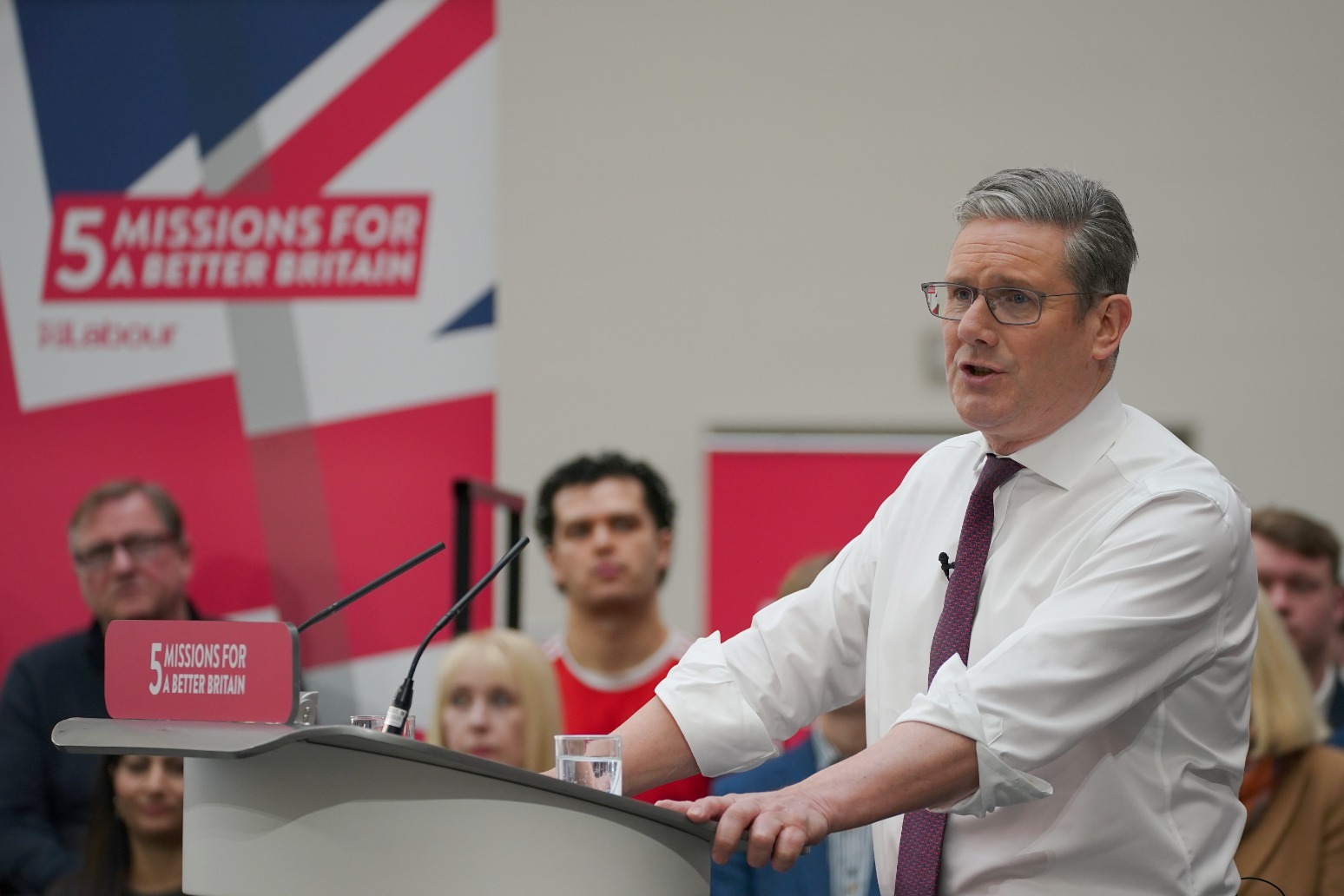
Sir Keir Starmer is pledging to restore British pride by boosting economic growth, fixing the NHS and tackling crime
Labour leader Sir Keir Starmer has promised to restore British pride by shaking up the way the government works to boost economic growth, fix the NHS and tackle crime.
Setting out five “missions” that would guide a Labour government, Sir Keir promised to end “sticking plaster politics” focused on short-term fixes.
He said Labour’s approach would offer “a clarity that will ruffle feathers across Whitehall and beyond, but one that is necessary”.
With his sights on a “decade of national renewal” – suggesting it would take at least two terms of Labour government – Sir Keir set out his missions:
– Securing the highest sustained growth in the G7, with good jobs and productivity growth in every part of the country;
– Making Britain a “clean energy superpower” with zero-carbon electricity generation by 2030;
– Building an NHS fit for the future by reforming health and care services to speed up treatment, harnessing life sciences and technology to reduce preventable illness and cutting health inequalities;
– Making Britain’s streets safe by reforming the police and justice system, to prevent crime, tackle violence against women and stop criminals getting away without punishment; and
– Breaking down the barriers to opportunity by reforming the childcare and education systems.
In echoes of New Labour, on his law and order pledge he promised to be “tough on crime, tough on the causes of crime” and also said that in carrying out reforms “I’m not concerned about whether investment or expertise comes from the public or private sector – I just want to get the job done”.
Comparing his approach to a football coach with a single-minded pursuit of success, he promised “a clarity that will ruffle feathers across Whitehall and beyond, but one that is necessary”.
Setting out why the change is required, he said: “Pick any of the current problems: energy security, productivity, immigration. We could be here all day but it wouldn’t matter – the pattern is always the same.
“Distracted by the short-term obsessions that fixate Westminster, held back by a cynicism, which uses low trust in politics as an excuse to narrow our ambitions, blinkered to the potential of an active government setting the direction, we lurch from crisis to crisis, always reacting, always behind the curve.
“A sticking plaster, never a cure.”
Sir Keir said his pledge on growth would drive up living standards across the country.
“I’m not interested in a model of growth where London races ahead and the rest of our country stagnates,” he said.
“Nor will I be satisfied if our growth depends on creating jobs that are low paid and insecure.
“We need growth from the grassroots – a new model. Wealth created everywhere, by everyone, for everyone.”
That would mean “good jobs and stronger productivity in every part of the country”, he said.
To achieve that would mean reforming apprenticeships, creating a modern childcare system and “a new deal for working people”.
Sir Keir also vowed to fix the Brexit deal and “reset our relationship with the EU”.
Taking aim at the Conservatives, in particular former prime minister Liz Truss and her supporters, he stressed the need for economic stability and said “they still don’t understand that chaos has a cost”.
“The noises you hear from them are a primal scream, the last gasp of a party caught between a rock of stagnation and the hard place of its economic recklessness.”
Sir Keir’s economic pledge would mean the UK outstripping the US, Germany, France, Italy, Canada and Japan in terms of growth, something he conceded “is going to be tough”.
The Labour leader was also dogged by questions about whether he will stick to his policy commitments, having dropped some of the pledges he made while seeking the party leadership.
“So far, as the pledges when I ran for leader are concerned, they are important statements of value and principle,” he told the BBC.
“And they haven’t all been abandoned by any stretch of the imagination. But what I have had to do is adapt some of them to the circumstances we find ourselves in.”
Published: by Radio NewsHub


